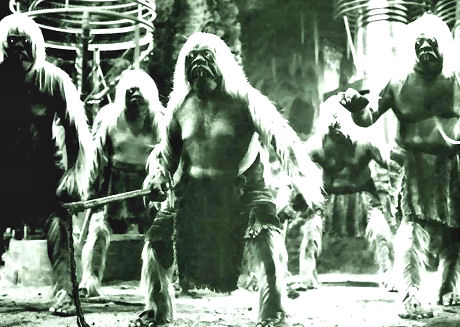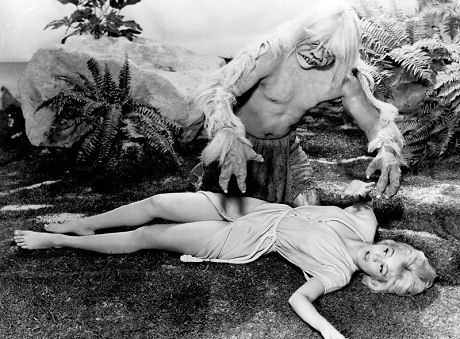Month: August 2009
Basic Rule
If someone famous dies as a result of an external force or condition (car crash, drowning, lightning on golf course), journalists report it. If someone famous dies due to some common disease or affliction, journalists report it. But if someone famous dies due to the usual result of blatantly self-destructive behavior (like heavy cigarette smoking, black-coffee-drinking or relentless fatty-food-eating for decades), journalists don’t report it. In other words, if someone in effect commits a form of slow-motion suicide, journalists would rather not point this out. Update: I should have just spat out what I was told a day or two earlier, which was that the late John Hughes was (or had been) a heavy cigarette smoker and coffee drinker. Actions more often than not have consequences.
South American Scuzballs
Dave McNary‘s Variety article about Triple Frontier, the next project for director Kathryn Bigelow and Mark Boal, said they;d be executive producing but declined to say in so many words if Bigelow will be directing. I’ve been told she in fact is attached to direct, which is basically a yeah-I’ll-probably-direct-but-I’d-rather-not-yet-sign posture.
The pic, being written by Boal, will be a crime drama he “set in the notorious border zone between Paraguay, Argentina and Brazil where the Igazu and Parana rivers converge — making ‘la triple frontera’ difficult to monitor and a haven for organized crime,” etc. None of which means anything about what kind of movie it might conceivably be. I don’t much like the title for the same reason — i.e., doesn’t convey anything.
Australian Sitdown

Actress Olya Zueva, who plays Angelina Jolie‘s mother in a ’70s flashback sequence in Phillip Noyce’s Salt (Sony, 7.10) — Sunday, 8.9.09, 8:40 pm. It was my contention that Olya is close to being a dead-ringer for Rachel Ward as she looked in the late ’70s. Certainly close enough.

Two bottles of Noyce Brothers vino that couldn’t be opened due to an upcoming tasting by wine guru Robert Parker.

Noyce’s longtime and much-trusted assistant Chris Nablo, a right guy who’s helped me out with this and that more than a few times — Sunday, 8.9.09, 7:55 pm.
Sommers!
In a q & a with Variety‘s Michael Fleming, G.I. Joe director and Morlock flunky Stephen Sommers blurted out the following comments:
(a) “I don’t think the mainstream critics are relevant [when it comes to G.I. Joe] — they have criticized themselves into irrelevancy. Transformers 2 got the worst reviews in the last decade, and it is the biggest hit of the year. More people will see that than any other movie. On my movie, it became so clear to us. Why not make those reviewers pay their $15 like everyone else?”
(b) “I’d shown it dozens of times, all around the world. The reaction has been overwhelmingly positive. Aside from doing close to $60 million, it got an A Cinema Score with people under 25. No matter what the critics say, the under 25 crowd is what’s most important.”
(c) “I know it sounds cliche, but I don’t read [reviews]. Why would I? I make the kind of movies critics love to hate. They love dark and depressing movies. If you make those, you expect they will love you, you need them to love you. The kind of movies I make? They don’t enjoy commercial or popular movies. I would say that geek love is hard to earn, and I got that in mounds. All the internet movie-haters love this movie. To win them over was something.”
Sommers sounds the way I expected him to sound. Like a polluting chemical plant owner or some sort of defensive Palinesque reactionary who talks in simple-minded us-vs.-them terms. Guys like Sommers are what that book, “When Good Things Happen to Bad People,” was all about.
Judd’s Rightie Agenda?
Seth Rogen, Judd Apatow‘s creative partner and all-around wing man, reportedly told an interviewer during the promo lead-up for Knocked Up that “we make extremely right-wing movies with extremely filthy dialogue.”
Rogen “was half-joking, of course, and it’s safe to say that you won’t see Apatow and his merry men at the next Christian Coalition fundraiser,” writes N.Y. Times Op-Ed columnist Ross Douthat. “But the one-liner got something important right. By marrying raunch and moralism, Apatow’s movies have done the near impossible: They’ve made an effectively conservative message about relationships and reproduction seem relatable, funny, down-to-earth and even sexy.
“No contemporary figure has done more than Apatow, the 41-year-old auteur of gross-out comedies, to rebrand social conservatism for a younger generation that associates it primarily with priggishness and puritanism.
“No recent movie has made the case for abortion look as self-evidently awful as Knocked Up, Apatow’s 2007 keep-the-baby farce. And no movie has made saving — and saving, and saving — your virginity seem as enviable as The 40-Year Old Virgin, whose closing segue into connubial bliss played like an infomercial for True Love Waits.
I know you look at the column, Judd, so I’ll just ask you straight-out — is this guy talking shit or have I been reading you wrong the whole time? I’ve always thought that a brainy Jewish comedy director-writer who’s into subversion and dick jokes would naturally be a pinko-lefty of some kind. That’s what you more or less are…right? A lefty? I just don’t know if I could handle hearing that you’re a closet conservative and that you’re friendly with Jon Voight.
I don’t presume this to be the case. I’d just like to hear from you personally that you’re cool and that you don’t, you know, belong to the NRA and play golf with Clint Eastwood (who, by the way, I personally like and is an excellent human being). I’m just mildly freaked by the possibility, no offense.
Check and Compare
In his latest Future of Classic posting, amctv.com columnist Bilge Ebiri points out several similarities between G.I. Joe: The Rise of Cobra and Trey Parker and Matt Stone‘s puppet-animated Team America: World Police. “There are so many similarities between the two movies that it’s almost impossible to keep track of them all,” Ebiri writes. On a scale of 1 to 10 how likely is it that G.I. Joe writers Stuart Beattie and David Elliot never saw Team America? Just asking.

Morlocks Are Feasting
So to recap, in the space of the last three days Bill Maher, Roger Ebert and N.Y. Times critic A.O. Scott have all deplored abundant indications of rank stupidity and infantilism among the general public — Maher addressing diminished or nonexistent political awareness levels and Ebert/Scott pointing to increasing popularity of idiot-level CG paintbox/dada movies and the kneejerk avoidance among the under-25s of films with even a smidgen of adult texture or provocation.

Which is what I’ve been bemoaning in no uncertain terms in this column for years, and which is entirely about my own personality and spiritual shortcomings and nothing to do with what’s actually happening out in the culture….right, naysayers?
As I stated yesterday, American moviegoing youths have essentially become Eloi. Scott paints an image of ticket-buyers as “mewling, incontinent little bundles of id with dirty minds and mouths — that’s pretty much what the major studios think of us.” Either way they’re seen as subjects for relatively easy manipulation and brain-washing by the junk-food-dispensing and junk-movie-dispensing Morlocks — i.e., corporate owners of movie studios, studio-chief henchmen, slash-and-profit producers like Joel Silver and Lorenzo di Bonaventura and (they’re all serving the same goal and the same gods) fast-food distributors.
Today’s Eloi are not lambs waiting to be led to the slaughter, as H.G. Wells and George Pal envisioned, but under-educated ADD pudge-bods looking for steady weekend slurps of cheap-drug highs. Nothing lasting or profound, mind, but tasty and dumbly enjoyable enough to create appetites and addictions.
“What kind of person constantly demands something new and yet always wants the same thing?,” Scott asks in his 12.7 article, titled “Spoon-Fed Cinema.” “A child, of course. From toddlerhood we are fluent in the pop-cultural consumerist idiom: Again! More! Another one! Children are ceaselessly demanding, it’s true; but they are also easily satisfied, and this combination of appetite and docility makes the child an ideal moviegoer.
“But since there are a finite number of literal children out there, with limited disposable income and short attention spans, Hollywood has to make or find new ones. And so the studios have, with increasing vigor and intensity, carried out a program of mass infantilization.

“A movie that people will go and see, almost as if they had no choice, is a safer business proposition than one they may have to bother thinking about. In this respect Transformers: Revenge of the Fallen is exemplary. It brilliantly stymies reflection, thwarts argument, arrests intelligent response. The most interesting thing about the movie — apart from Megan Fox‘s outfits, I suppose — is that it has made nearly $400 million domestically.
“There is nothing else to say. Any further discussion — say about whether it’s a good movie or not — sounds quaint, old-fashioned, passe. Get a clue, grandpa.
The new Hollywood climate is one in which “middle-aged actors and critically lauded directors look like extravagances rather than sound investments,” Scott concludes. “Forty is the new dead. Auteur is French for unemployed. The Hurt Locker — the kind of fierce and fiery action movie that might have been a blockbuster once upon a time — is treated like a delicate, exotic flower, released into art houses and sold on its prestige rather than on its visceral power.”
Bothered
Why is it that every time I make a particular and referenced point about some current topic of interest or intrigue, 90% of the reader responses always meander off-topic or bring up their own curious crotch-scratch issues or generally downgrade the discourse? I put some thought into these pieces, dammit, and 90% of the time people go, “Yeah, whatever…but I have something else to discuss of a more coarse and common nature.”
In The Tank
In Contention‘s Guy Lodge has written that U.S. audiences are going to have “wait indefinitely” to see Andrea Arnold‘s Fish Tank. The reason, as I wrote in my Cannes review, is that it’s “basically a female Billy Elliot with no hope, no shot, no Julie Walters to teach and encourage, no father willing to break his back in order to pay for his child’s education at a London arts academy, no Marc Bolan singing ‘I Love To Boogie’…none of that.”
Fish Tank “is extremely well captured with a powerhouse performance by Jarvis, but it’s all about the shit end of the stick.
“The story is about how Mia (Katie Jarvis) gets it in her head that her mom’s new boyfriend, a handsome, good natured security guard named Connor (Michael Fassbender), may have a bit of what she needs. A friendly smile, a kindly attitude, a positive paternal-ish influence. And for a while he seems like a good thing, especially with his encouragements about Mia’s dancing, which he says is ‘great.’ And then you know what happens. If you can’t guess you need to think harder.
“The grimness in Fish Tank is, I think, vaguely similar to the mood and material in Tony Richardson‘s The Loneliness of the Long-Distance Runner. Tom Courtenay played an angry resentful teen who winds up in a borstal for thievery, but his ace in the hole — i.e., being a good long-distance runner — is used to deliver a jolting dramatic turn at the finale, one that said something profound about nihilism among working-class youths of the early ’60s.
“Fish Tank‘s story never even begins to build into anything remotely similar. It pretty much stays in the pit from start to finish.”
Eloi
“Certainly most of those who see The Hurt Locker become enthusiastic advocates of the film,” notes Roger Ebert, “but apparently those younger viewers who have seen it haven’t had much of an influence on their peers. While the success of the film continues to grow as it steadily increases its number of theaters, the majority of younger filmgoers are missing this boat.
“Why is that? They don’t care about reviews, perhaps. They also resist a choice that is not in step with their peer group. Having joined the crowd at “Transformers,” they’re making their plans to see G. I. Joe. Some may have heard about The Hurt Locker but simply lack the nerve to suggest a movie choice that involves a departure from groupthink.
“Of course there are countless teenagers who seek and value good films. I hear from them all the time in the comment threads on this blog. They’re [also] frank about their contemporaries. If they express a nonconformist taste, they’re looked at as outsiders, weirdoes, nerds. Their dates have no interest in making unconventional movie choices. They’re looked at strangely if they express no desire to see that weekend’s box office blockbuster.
“Even some of their teachers, they write, are unfriendly to them ‘always bringing up movies nobody has ever heard of.” If you hang around on these threads, you know the readers I’m referring to, including ‘A Kid,’ who writes so well that if she hadn’t revealed her age (just turned 13) we would have taken her for a literate, articulate adult.
“If I mention the cliché ‘the dumbing-down of America,’ it’s only because there’s no way around it. And this dumbing-down seems more pronounced among younger Americans. It has nothing to do with higher educational or income levels. It proceeds from a lack of curiosity and, in many cases, a criminally useless system of primary and secondary education. Until a few decades ago, almost all high school graduates could read a daily newspaper. The issue today is not whether they read a daily paper, but whether they can.
“Some weeks ago I went so far as to suggest the gap between some critics and some moviegoers may be because the critics are more ‘evolved.’ Man, did the wrath hit the fan. I was clearly an elitist snob. But think about it. Wouldn’t you expect a critic to be more highly evolved in taste than a fanboy zealot? And what about ‘A Fan?’ Should she be shunned by her peers for having her own ideas?
“And what about another one of my readers, the 15-year-old who says he has viewed dozens of my ‘Great Movies?’ If you’re his friend, isn’t it worth wondering what he’s stumbled onto? And what about your date this Friday night? If he or she only wants to see the movie ‘everyone’ is going to see, is that person going to be much good for conversation?”
A couple of weeks ago I was sitting in a low-rent cafe on Melrose across from Fairfax High School. I was writing on the laptop and reading the L.A. Weekly when all of a sudden a bunch of kids came in. School had let out, I gathered. I began to feel quietly appalled very quickly. They were huge roly-poly apes, these guys. A lower life form, breathing heavily and wolfing down donuts and slurping down drinks, all wearing cutoffs and sandals, some of them sitting down on the counter seats with their dumb-ass expressions and stupid-ass butch haircuts and shaved heads and huge Abominable Snowman feet with absurdly large and unmanicured toes. All I wanted to do was leave. Which I did.
Too Dumb To Breathe
“I’m the bad guy for saying it’s a stupid country,” Bill Maher said during last Friday’s New Rules rant, “yet polls show that a majority of Americans cannot name a single branch of government, or explain what the Bill of Rights is. 24% could not name the country America fought in the Revolutionary War. More than two-thirds of Americans don’t know what’s in Roe v. Wade. Two-thirds don’t know what the Food and Drug Administration does.
“Some of this stuff you should be able to pick up simply by being alive. You know, like the way the Slumdog kid knew about cricket.
“Not here. Nearly half of Americans don’t know that states have two senators and more than half can’t name their congressman. And among Republican governors, only 30% got their wife’s name right on the first try.
“Sarah Palin says she would never apologize for America. Even though a Gallup poll says 18% of Americans think the sun revolves around the earth. No, they’re not stupid. They’re interplanetary mavericks. A third of Republicans believe Barack Obama is not a citizen, and a third of Democrats believe that George Bush had prior knowledge of the 9/11 attacks, which is an absurd sentence because it contains the words ‘Bush’ and ‘knowledge.'”
There’s a letter describing the American yahoo brigade on Andrew Sullivan‘s Daily Dish. Here’s a portion:
“They have always been with us, the people who believed in manifest destiny, who delighted in the slaughter of this land’s original inhabitants, who cheered a nation into a civil war to support an economic system of slavery that didn’t even benefit them. They are the people who bashed the unions and cheered on the anti-sedition laws, who joined the Pinkertons and the No Nothing Party, who beat up Catholic immigrants and occasionally torched the black part of town. They rode through the Southern pine forests at night, they banned non-European immigration, they burned John Rockefeller Jr. in effigy for proposing the Grand Tetons National Park.
“These are the folks who drove Teddy Roosevelt out of the Republican Party and called his cousin Franklin a communist, shut their town’s borders to the Okies and played the protectionist card right up until Pearl Harbor, when they suddenly had a new foreign enemy to hate. They are with us, the John Birchers, the anti-flouride and black helicopter nuts, the squirrly commie-hating hysterics who always loved the loyalty oath, the forced confession, the auto-de-fe. Those who await with baited breath the race war, the nuclear holocaust, the cultural jihad, the second coming. They make up much more of America then you would care to think.”
